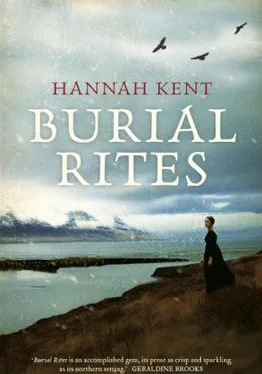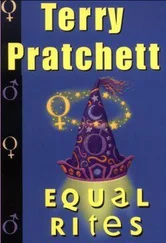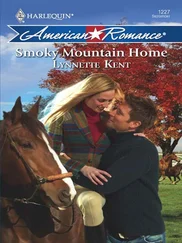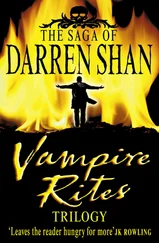‘What did Blöndal say?’
Jón grimaced. ‘What do you think he said? Thórdarson’s a nobody. He has someone else in mind, although there’s some who are against it.’
Tóti glanced at the farmhand, who was slouching against the smithy wall, listening. ‘Who would that be?’ Tóti asked.
Jón shook his head, disgusted. It was the farmhand who spoke.
‘Gudmundur Ketilsson,’ he said, loudly. ‘Natan’s brother.’
‘We can sit inside if you prefer,’ Tóti said, nearly stumbling over the rocks next to the rushing stream by the Kornsá farm.
‘I like to watch the water,’ Agnes replied.
‘Very well.’ Tóti wiped the wet spray off a large rock and gestured for Agnes to sit down. He sat next to her.
The Kornsá stream offered a good view across the river. It was beautiful, but Tóti could think only of Jón’s earlier words about the executioner. He stole a glance at Agnes’s pale neck against the grey of the rock and imagined it slit.
‘How was the harvest yesterday?’ he asked, trying to clear his mind.
‘It was very warm.’
‘Good,’ Tóti replied.
Agnes reached into her shawl and pulled out a bundle of wool and several thin knitting needles. ‘You wanted to ask me about my family?’
Tóti cleared his throat and watched her fingers move as she began to knit. ‘Yes. You were born at Flaga.’
Agnes inclined her head towards the farm in question, a slouched croft to the left of Kornsá’s border. It was close enough that the voices of its servants, calling to one another outside, could be heard on the wind. ‘The very one.’
‘Your mother was unmarried.’
‘You learnt that from the ministerial book?’ Agnes gave a tight smile. ‘The priests always make sure they write the important things down.’
‘And your father, Magnús?’
‘Magnús was unmarried too, if that’s what you mean.’
Tóti hesitated. ‘Who did you live with as a child, then?’
Agnes gazed about the valley. ‘I’ve lived in most of these farms.’
‘Your family moved about?’
‘I don’t have any family. My mother left me when I was six.’
‘How did she die?’ Tóti asked gently. He was taken aback when Agnes laughed.
‘Does my life seem such a story of tragedy? No, she left me for others to deal with, but I suppose she’s still alive. I wouldn’t know. Someone told me she’d gone into the blue. Just upped and left one day. That was some years ago now.’
‘What do you mean?’
‘I don’t know anything about my mother. I wouldn’t recognise her if I saw her.’
‘Because you were only six winters old when she left you?’
Agnes stopped knitting and looked Tóti squarely in the face. ‘You have to understand, Reverend, that the only things I know about my mother are what other people have told me. Mainly what she did, which, you’ll understand, they didn’t approve of.’
‘Could you tell me what you were told?’
Agnes shook her head. ‘To know what a person has done, and to know who a person is, are very different things.’
Tóti persisted. ‘But, Agnes, actions speak louder than words.’
‘Actions lie,’ Agnes retorted quickly. ‘Sometimes people never stood a chance in the beginning, or they might have made a mistake. When people start saying things like she must be a bad mother because of that mistake…’
When Tóti said nothing in response she went on.
‘It’s not fair. People claim to know you through the things you’ve done, and not by sitting down and listening to you speak for yourself. No matter how much you try to live a godly life, if you make a mistake in this valley, it’s never forgotten. No matter if you tried to do what was best. No matter if your innermost self whispers, “I am not as you say!” — how other people think of you determines who you are.’
Agnes stopped to take a breath. She had begun to raise her voice, and Tóti wondered what had provoked this sudden gush of words.
‘That’s what happened to my mother, Reverend,’ Agnes continued. ‘Who was she really? Probably not as people say she was, but she made mistakes and others made up their minds about her. People around here don’t let you forget your misdeeds. They think them the only things worth writing down.’
Tóti thought for a moment. ‘What was your mother’s mistake?’
‘I’ve been told she made many, Reverend. But at least one of those mistakes was me. She was unlucky.’
‘What do you mean?’
‘She did what any number of women do harmlessly in secret,’ Agnes said bitterly. ‘But she was one of the unfortunate few whose secrets are made visible to everyone.’
Tóti could feel the hot creep of a blush appear on his face. He looked down at his hands and tried to clear his throat.
Agnes looked at him. ‘I’ve offended you again,’ she said.
Tóti shook his head. ‘I’m glad that you tell me of your past.’
‘My past has offended your sensibilities.’
Tóti shifted his seat on the rock. ‘What about your father?’ he tried.
Agnes laughed. ‘Which of them?’ She stopped knitting to study him. ‘What did your book say about my father?’
‘That his name was Magnús Magnússon and that he was living at Stóridalur at the time of your birth.’
Agnes continued to knit, but Tóti noticed that she was clenching her jaw. ‘If you spoke to certain people about these parts you might get a different story.’
‘How is that?’
Agnes looked out across the river to the farms on the opposite side of the valley, silently counting the stitches on her needle with her finger. ‘I suppose it doesn’t matter if I’m honest with you or not,’ she said coldly. ‘I could say anything to you.’
‘Indeed, I hope you will confide in me,’ Tóti said, misunderstanding. He leaned closer in anticipation of what she would say.
‘Your book at Undirfell ought to have said Jón Bjarnason, the farmer at Brekkukot. I’ve been told that he is my real father, and Magnús Magnússon is a hapless servant who didn’t know better.’
Tóti was perplexed. ‘Why would your mother name you Magnús’s daughter if that were not the truth?’
Agnes turned to him, half-smiling. ‘Have you no idea of how the world works, Reverend?’ she asked. ‘Jón of Brekkukot is a married man with enough legitimate children of his own. Oh, and plenty like me, you can be sure. But it seems a lesser crime to create a child with an unmarried man than one already bound in flesh and soul to another woman. So I suppose my mother picked a different sod to have the honour of fathering me.’
Tóti considered this for a moment. ‘And you believe this because others told you so?’
‘If I believed everything everyone had ever told me about my family I’d be a sight more miserable than I am now, Reverend. But it doesn’t take an education in Copenhagen or down south to work out which bairns belong to which pabbis in these parts. Hard to keep a secret to yourself here.’
‘Have you ever asked him?’
‘Jón Bjarnason? And what would be the good of that?’
‘To get the truth out of him, I suppose,’ Tóti suggested. He was feeling disappointed with the conversation.
‘No such thing as truth,’ Agnes said, standing up.
Tóti stood up also and began rubbing the seat of his pants. ‘There is truth in God,’ he said, earnestly, recognising an opportunity to do his spiritual duty. ‘John, chapter eight, verse thirty-two: “And ye… ”’
‘Shall know the truth, and the truth shall make you free. Yes, I know. I know,’ Agnes said. She bundled her knitting things together and began to walk back down to the farm. ‘Not in my case, Reverend Thorvardur,’ she called to him. ‘I’ve told the truth and you can see for yourself how it has served me.’
Читать дальше










